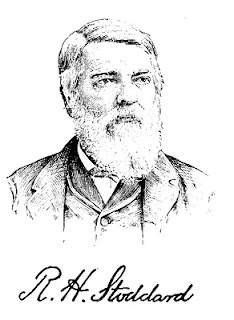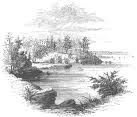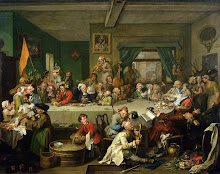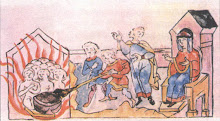"To vilify a great man is the readiest way in which a little man can himself attain greatness."
-Edgar Allan Poe
 Although certain of Poe's more unpleasant biographers show obvious reluctance in discarding this alleged attempt to make Osgood his partner in sin--they clearly would like such a sordid story to be true--(one wonders, incidentally, how Mrs. Clemm would figure in this purported elopement)--discard it they must. Aside from the sheer delirious insanity of the tale, any glance at the timeline renders it an impossibility. Harrington had left Albany, where he was a Unitarian minister--one shudders to imagine his sermons--by the beginning of April 1847. From Virginia Poe's death in January of that year until the time Harrington left his Albany flock, Osgood was still in Philadelphia, and Poe living in seclusion at Fordham, battling grief and serious illness. It is also curious that, if this shocking incident truly took place, Osgood would make such an effort, in the reminiscences she published after Poe's death, to depict a close friendship with him. Or that anyone else Osgood treated to her "raillery" about this attempted seduction never came forward with such a sensational piece of gossip. Or that the many other women who knew Poe never thought him even remotely capable of such indecency. In fact, it was from his female acquaintances--including Osgood--that we get the most emphatic accounts of Poe's innate chivalry and gentleness, which would hardly be the case if he had been the brazen satyr of Harrington's dreams.
Although certain of Poe's more unpleasant biographers show obvious reluctance in discarding this alleged attempt to make Osgood his partner in sin--they clearly would like such a sordid story to be true--(one wonders, incidentally, how Mrs. Clemm would figure in this purported elopement)--discard it they must. Aside from the sheer delirious insanity of the tale, any glance at the timeline renders it an impossibility. Harrington had left Albany, where he was a Unitarian minister--one shudders to imagine his sermons--by the beginning of April 1847. From Virginia Poe's death in January of that year until the time Harrington left his Albany flock, Osgood was still in Philadelphia, and Poe living in seclusion at Fordham, battling grief and serious illness. It is also curious that, if this shocking incident truly took place, Osgood would make such an effort, in the reminiscences she published after Poe's death, to depict a close friendship with him. Or that anyone else Osgood treated to her "raillery" about this attempted seduction never came forward with such a sensational piece of gossip. Or that the many other women who knew Poe never thought him even remotely capable of such indecency. In fact, it was from his female acquaintances--including Osgood--that we get the most emphatic accounts of Poe's innate chivalry and gentleness, which would hardly be the case if he had been the brazen satyr of Harrington's dreams.And, amazingly, Harrington managed to make this the most credible story in his repertoire. Harrington's other allegations are so demonstrably and embarrassingly false that even Poe's most hostile chroniclers avoid so much as mentioning them--probably because those tales utterly destroy the credibility of anything the man ever said. Harrington tried forcing upon the world a pack of unprecedentedly ugly tales that lacked even the faintest shadow of corroboration and were, by his own admission, based solely on hearsay he claimed to have heard about a man who was a complete stranger to him. He also failed to explain why he, as well as all the other people who must have been aware of Poe's scandalous, if not criminal, behavior managed to keep it to themselves that long. In short, Superintendent Harrington lied like a dog.
That he wished to give all the publicity in his power to vicious stories that he must have known were false is patent. The mystery here is what Charles Fort would call "the whyness of it." What were Harrington's motives for making a public spectacle of himself--not to mention dragging through the mud the name of his late sister-in-law? To Stoddard, he claimed to be motivated by a desire to correct any suggestion that Osgood had harbored a tendresse for Poe. To "The Critic," he claimed to be coming forward out of disgust with current efforts to vindicate Poe's character.
If all this was true, why did it take him so long? If he was so concerned with Osgood's reputation, why didn't he come forward in 1860, when Mrs. Whitman published the source of the passage in Stoddard's article that Harrington claimed to find so offensive? Or in the 1870s, when Whitman began peddling the claim that a great scandal erupted when Elizabeth Ellet saw a (presumably compromising) letter written to Poe by Osgood? Certainly, Whitman's nutty and uncorroborated story, which was widely disseminated (and, unfortunately, treated as fact,) by John Ingram, William Gill, and Whitman herself, put Osgood's relations with Poe in a more scurrilous light than anything Stoddard had written.
And as for his second reason for unburdening himself--many people had rushed to Poe's defense ever since Griswold's obituary of him first appeared. If tributes to Poe so infuriated Harrington, how did he manage to hold his tongue through nearly forty years of them? (Curiously, he admitted that Griswold's memoir--which was certainly milder than anything Harrington himself wrote--was "saturated with malignity.")
It all looks very like he was simply grabbing at any feeble excuse he could to suddenly come forward with his stories. Harrington must have had a particular reason for circulating his slanders at that particular time. But what?
The only clue we are given lies in a particularly odd passage in his letter to "The Critic." He claimed there was "a studious effort to brand the writers who have set forth the honest truth about Poe as a band of conspirators, consciously devoted to the task of damaging his fair and honorable reputation." Harrington, of course, frantically denied there was any truth to the allegation--which, so far as we know, was never actually made by anyone. Publicly, at least. It comes off as "protesting too much."
Compare that statement with one of his letters to Stoddard. He pushed his correspondent to "vindicate yourself most surely" by circulating "a simple array" of stories--to be provided by Harrington--"attested by responsible persons, providing instances of Poe's reckless criminality and of moral degradation." As an example of the fine, rich dirt he could offer Stoddard--rather like a salesman offering samples of his wares--Harrington then presented, with an obvious and quite disturbing relish, his salacious story about the young wife Poe had deliberately seduced and "ruined."
Now, what do we have here but an effort to enlist Stoddard into a "conspiracy" "consciously devoted to the task of damaging Poe's fair and honorable reputation?"
There is no question that there was an organized effort to destroy Poe professionally and personally during his life, and that these efforts continued, or even intensified, after his death. Sidney P. Moss, who wrote extensively about Poe's literary wars, even described the forces against him as acting in "collusion" and "collaborating"--conspiring, to put it plainly--although Moss always shrank from exploring the full implications of this observation. Moss noted that Poe's antagonists first tried merely to freeze him out of the literary world; his obvious genius making that impossible, they then sought to annul the impact of his work by destroying him as a man. "The truth," Moss wrote, "is that Poe as a critic was successful to the point of his own undoing. Having allowed his enemies no ground on which to stand, he drove them to discredit his criticism by discrediting him as a human being. In this they succeeded, and so well, that it may be forever impossible to deflate the Poe myth to its proper proportions." (Indeed, Harrington repeatedly insisted that Poe's alleged moral failings made it impossible to honor him, no matter what his literary accomplishments may have been.) What set Harrington apart from Poe's other defamers is that he was too stupid to play the game with any finesse. He over-egged the pudding, peddling lies that were so revolting and so blatantly fictional that they only backfired on him.
Henry Harrington--on the surface, a mere filthy-minded, half-mad creep--was clearly part of something far more insidious.
(Image: NYPL Digital Gallery)

























